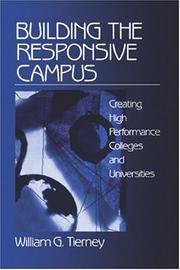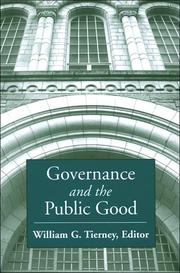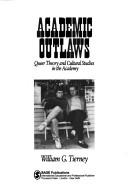| Listing 1 - 10 of 31 | << page >> |
Sort by
|

ISBN: 0761909877 0761909885 1322418012 145226340X 9781452263403 9781452232478 1452232474 9780761909873 9780761909880 9781322418018 Year: 1999 Publisher: Thousand Oaks, Calif : Sage,
Abstract | Keywords | Export | Availability | Bookmark
 Loading...
Loading...Choose an application
- Reference Manager
- EndNote
- RefWorks (Direct export to RefWorks)
Tierney uses research derived from ethnographies, case studies and interviews to address the problems that many academic institutions have today in clinging to the practices and organization of the past.
Educational change --- Universities and colleges --- Enseignement --- Universités --- Administration. --- Faculty. --- Réforme --- Administration --- Corps enseignant --- Campus planning. --- Organizational change. --- College campuses --- Educational planning --- College administrators --- Change, Organizational --- Organization development --- Organizational development --- Organizational innovation --- Management --- Organization --- Manpower planning --- Planning

ISBN: 0791481263 1429413638 9781429413633 9780791468753 9780791481264 0791468755 0791468763 9780791468760 9780791481264 Year: 2006 Publisher: Albany, NY : State University of New York Press,
Abstract | Keywords | Export | Availability | Bookmark
 Loading...
Loading...Choose an application
- Reference Manager
- EndNote
- RefWorks (Direct export to RefWorks)
The public good is not merely an economic idea of goods and services, but a place where thoughtful debate and examination of the polis can occur. In differentiating the university from corporations and other private sector businesses, Governance and the Public Good provides a framework for discussing the trend toward politicized and privatized postsecondary institutions while acknowledging the parallel demands of accountability and autonomy placed on sites of higher learning.If one accepts the notion of higher education as a public good, does this affect how one thinks about the governance of America's colleges and universities? Contributors to this book explore the role of the contemporary university, its relationship to the public good beyond a simple obligation to educate for jobs, and the subsequent impact on how institutions of higher education are and should be governed.
Education, Higher --- Social aspects --- Political aspects --- Administration. --- Enseignement supérieur --- Administration --- Congrès --- Aspect politique --- Aspect social
Book
ISBN: 1435679946 9781435679948 9781579229276 1579229271 9781579222871 1000973301 1003447880 1000978389 Year: 2008 Publisher: Sterling, Va. : Stylus Pub.,
Abstract | Keywords | Export | Availability | Bookmark
 Loading...
Loading...Choose an application
- Reference Manager
- EndNote
- RefWorks (Direct export to RefWorks)
"The message of this book is that understanding organizational culture is critical for those who recognize that academe must change, but are unsure how to make that change happen. An understanding of culture enables an organization's participants to interpret the institution to themselves and others, and in consequence, to propel the institution forward." "An organization's culture is reflected in what is done, how it is done, and who is involved in doing it. It concerns decisions, actions, and communication on an instrumental and symbolic level. This book considers various facets of academic culture, discusses how to study it, how to analyze it, and how to improve it in order to move colleges and universities aggressively into the future, while maintaining core academic values."--Jacket.
Universities and colleges --- College environment. --- College environment --- Theory & Practice of Education --- Education --- Social Sciences --- Campus climate (College environment) --- Environment, College --- Environment, University --- University environment --- School environment --- Colleges --- Degree-granting institutions --- Higher education institutions --- Higher education providers --- Institutions of higher education --- Postsecondary institutions --- Public institutions --- Schools --- Education, Higher --- Administration --- Decision making --- Social aspects. --- Social aspects --- Decision making.
Book
ISBN: 1421413078 9781421413075 9781421413068 142141306X Year: 2014 Publisher: Baltimore, Maryland : Johns Hopkins University Press,
Abstract | Keywords | Export | Availability | Bookmark
 Loading...
Loading...Choose an application
- Reference Manager
- EndNote
- RefWorks (Direct export to RefWorks)
SOCIAL SCIENCE / Media Studies. --- GAMES / Video & Electronic. --- EDUCATION / Higher. --- Social media. --- Computer games. --- Video games. --- Play --- Education, Higher --- User-generated media --- Communication --- User-generated content --- Application software --- Electronic games --- Technological innovations --- Television games --- Videogames --- College students --- Higher education --- Postsecondary education --- Universities and colleges --- Social aspects. --- Effect of technological innovations on. --- Education --- Computer games --- Internet games --- Games
Book
ISBN: 1421417685 9781421417684 9781421417684 1421417685 Year: 2015 Publisher: Baltimore: Johns Hopkins University press,
Abstract | Keywords | Export | Availability | Bookmark
 Loading...
Loading...Choose an application
- Reference Manager
- EndNote
- RefWorks (Direct export to RefWorks)

ISBN: 0761906827 0761906835 Year: 1997 Publisher: Thousand Oaks, Calif. : Sage Publications,
Abstract | Keywords | Export | Availability | Bookmark
 Loading...
Loading...Choose an application
- Reference Manager
- EndNote
- RefWorks (Direct export to RefWorks)
Gay and lesbian studies. --- Culture --- Gay teachers --- Etudes sur les homosexuels --- Culture --- Enseignants homosexuels --- Study and teaching (Higher) --- Etude et enseignement (Supérieur)
Book
ISBN: 1483327876 1452249075 Year: 1997 Publisher: Thousand Oaks, Calif. : Sage Publications,
Abstract | Keywords | Export | Availability | Bookmark
 Loading...
Loading...Choose an application
- Reference Manager
- EndNote
- RefWorks (Direct export to RefWorks)
Scholarly yet provocatively written, Academic Outlaws presents a discussion of how life in the academic world is experienced by gay men and lesbian women. Using a narrative style that mixes autobiography, case study data and fiction, William G Tierney provides timely insight into the challenges gays and lesbians face in higher education and proposes an alternative process for redefining long-established cultural norms.
Culture -- Study and teaching (Higher). --- Gay and lesbian studies. --- Gay culture. --- Gay teachers. --- Gays -- Identity. --- Queer theory. --- Culture --- Gays --- Study and teaching (Higher) --- Identity.
Book
ISBN: 1438484518 9781438484518 9781438484495 1438484496 9781438484501 143848450X Year: 2021 Publisher: Albany : State University of New York Press,
Abstract | Keywords | Export | Availability | Bookmark
 Loading...
Loading...Choose an application
- Reference Manager
- EndNote
- RefWorks (Direct export to RefWorks)
Uses a cross-national comparison of Los Angeles, New Delhi, and Hong Kong to develop strategies universities should employ to strengthen democracy and resist fascism.
Education, Higher --- Universities and colleges --- Democracy and education. --- Civil society. --- Political aspects. --- Aims and objectives.

ISBN: 0585246769 9780585246765 9781483327877 1483327876 1452249075 9781452249070 0761906827 9780761906827 0761906827 0761906835 9780761906827 9780761906834 Year: 1997 Publisher: [Place of publication not identified] Sage Publications
Abstract | Keywords | Export | Availability | Bookmark
 Loading...
Loading...Choose an application
- Reference Manager
- EndNote
- RefWorks (Direct export to RefWorks)
Scholarly yet provocatively written, Academic Outlaws presents a discussion of how life in the academic world is experienced by gay men and lesbian women. Using a narrative style that mixes autobiography, case study data and fiction, William G Tierney provides timely insight into the challenges gays and lesbians face in higher education and proposes an alternative process for redefining long-established cultural norms.
Gay and lesbian studies --- Culture --- Sexual minority teachers. --- Sexual minority culture. --- Queer theory --- Study and teaching (Higher) --- Identity --- Gay and lesbian studies. --- Gay teachers. --- Gays --- Identity. --- Gay teachers --- Etudes sur les homosexuels --- Enseignants homosexuels --- Etude et enseignement (Supérieur) --- Queer theory. --- Gay people
Book
ISBN: 1438481292 9781438481296 9781438481272 1438481276 9781438481289 1438481284 Year: 2020 Publisher: Albany, New York : State University of New York Press,
Abstract | Keywords | Export | Availability | Bookmark
 Loading...
Loading...Choose an application
- Reference Manager
- EndNote
- RefWorks (Direct export to RefWorks)
"Higher education always seems to be in crisis. Governments, foundations, professional associations, and the occasional scornful professor all tend to lament one or another problem plaguing America's colleges and universities. The more apocalyptic tracts claim that the US is a "Nation at Risk," that our students' minds have been closed, or that radical faculty have run-a-muck and are brainwashing America's youth. In Get Real, leading scholar of higher education, William G. Tierney cuts through this noise, drawing on his experience and expertise to ask readers the same question he asks his students-What do you think? In forty-nine short, engaging essays, Tierney aims not to stoke the flames of controversy or promote a particular stance but to provoke creative, forward-looking public discussion about what higher education could and should look like in the twenty-first century. Tierney clearly distills and offers his take on critical issues-from diversity and free speech to the rise of for-profit colleges and student debt. Still, the goal is always to give readers the background and tools to form their own opinions. Written in a conversational tone and laced with personal anecdotes, Get Real is informed by scholarly literature without being weighed down by it and includes suggestions for further reading based on areas of interest"--
| Listing 1 - 10 of 31 | << page >> |
Sort by
|

 Search
Search Feedback
Feedback About UniCat
About UniCat  Help
Help News
News